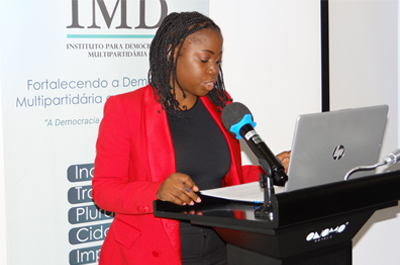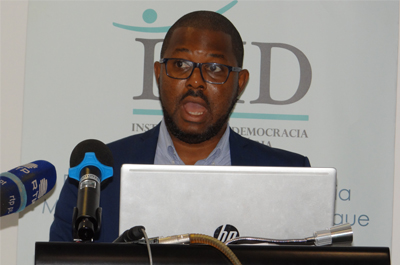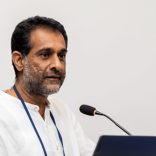Dismantling USAID could lead to mass deaths - AIM report
Mozambique: ‘Desertions’ heighten hopes of end to violence – analysts

Egna Sidumao. [Photo: IMD]
Mozambican analysts on Tuesday said that the agreement by André Matsangaíssa Júnior, one of the main faces of the self-proclaimed Renamo Military Junta, to join the peace agreement boosted expectations of an end to armed violence in the centre of the country.
“There is greater hope [regarding the end of armed violence] with the defections at the top of the Military Junta hierarchy,” said Egna Sidumo, a researcher at the Centre for Strategic and International Studies, Joaquim Chissano University.
Sidumo spoke at a conference on the “Opening of the Political Year 2021: Assessment of the Political Year 2020 and prospects for 2021,” supported by the Institute for Multi-Party Democracy (IMD), a Mozambican civil society organisation.
The researcher, who is also a university lecturer, pointed specifically to the fact that André Matsangaíssa Júnior spoke to the Mozambican president, Filipe Nyusi, after leaving the Military Junta, as an important step for the success of the Disarmament, Demobilisation and Reintegration (DDR) process of the Mozambican National Resistance (Renamo) guerrilla group and the adherence of members of the Military Junta to the operation.
Sidumo called for the involvement of more social and political actors in implementing the Peace and National Reconciliation Agreement, signed between the Mozambican government and Renamo on 6 August 2019, for the successful outcome of the stages advocated in the understanding.
Dércio Alfazema, IMD member and political analyst, also noted the impact of the abandonment of the Military Junta by André Matsangaíssa Júnior on the end of military violence in the centre of the country.

André Matsangaíssa Júnior was a key strategist of the Renamo Military Junta, and his departure from the movement will affect the group’s actions, he added.
Alfazema noted, however, that the implementation of the Peace and National Reconciliation Agreement and the DDR should not be the monopoly of the government and Renamo because peace is a collective good.
“The process should be monitored by civil society and should be implemented with maximum transparency,” he said.
André Matsangaíssa Júnior is the nephew of André Matade Matsangaíssa, founder and first commander of Renamo, who led the organisation when it started the civil war against the Mozambican Liberation Front (Frelimo) government in 1977 until he died in combat in 1979.
André Matsangaíssa Júnior was received on Monday in Maputo by the Mozambican President after announcing he joined the DDR.
“The goal that brought me here is peace in central Mozambique,” he told journalists, moments after a meeting with Filipe Nyusi and the United Nations secretary-general’s special envoy to Mozambique, Mirko Manzoni, at the Presidency.
Matsangaíssa Júnior is the third face of the self-proclaimed Renamo military junta to surrender, after João Machava and Paulo Nguirande, two other influential members of that group which contests the Renamo leadership and accuses the current party leader of having diverted the spirit of the peace negotiations with the government.
The self-proclaimed Renamo military junta, led by former guerrilla leader Mariano Nhongo, is accused of carrying out armed attacks against civilians and government forces on roads and villages in the provinces of Sofala and Manica, central Mozambique that have caused the death of at least 30 people since August last year.












Leave a Reply
Be the First to Comment!
You must be logged in to post a comment.
You must be logged in to post a comment.